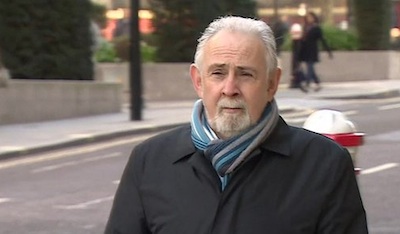
Donegal republican John Downey walked free today after a court in London said charges against him of taking part in an IRA campaign in 1982 amounted to “an abuse of process”. But the decision to release him has created confusion and anger in the north of Ireland over a previously secret scheme to tackle the issue of OTRs -- those ‘on the run’ from outstanding conflict-related prosecutions.
The case against Mr Downey collapsed at the Old Bailey after the judge acknowledged that he was one of almost two hundred people who have received letters assuring them they did not face arrest and prosecution on IRA charges.
The decision was announced at a hearing into whether his trial should go ahead for an attack in Hyde Park in London in which four British soldiers died.
The deal between the British government and Sinn Fein to provide assurance for certain republicans facing outstanding prosecutions had never been detailed before.
Mr Justice Sweeney heard from Sinn Fein’s Gerry Kelly that a total of 187 people had received letters from the British government confirming that they did not face arrest or prosecution.
The letters formed an ad-hoc mechanism to resolve the long-running issue of OTRs. The court heard that the first letters had come from 10 Downing Street, when Tony Blair was Prime minister.
Blair’s chief of staff, Jonathan Powell, told the hearing he was the signatory of the initial letters. Later signatories to similar letters were senior officials in the Northern Ireland Office, he said.
“Although this had not been the solution first envisaged by the British government in its wish to deal with this particular aspect of the past, nevertheless it was intended to provide a solution that worked in practice even if more slowly and in a more cumbersome and less universal way than had been wished by those negotiating on behalf of Sinn Fein.”
Former British Direct Ruler Peter Hain told the court that an “administrative scheme” that had begun as a temporary measure, became the means by which the issue of OTRS was dealt with, when efforts to establish a formal mechanism failed.
“The scheme addressed the position of individuals who, through Sinn Fein, put their names forward,” Hain said.
“To qualify for consideration, the offences for which each individual who believed he or she might be suspected, or ‘wanted’, in some cases already convicted and having escaped from prison, should have been committed before the signing of the Good Friday Agreement in 1998 and have been connected with the conflict in Northern Ireland.
“The group to which the individual concerned was affiliated, ie the IRA, must adhere to the commitment to cessation of armed conflict.
“Whilst the first cases pressed by Sinn Fein concerned those who lived and had family in the north of Ireland, the scheme extended to applicants in the Republic of Ireland who had no such relationships and to persons whose extradition had been actively sought from within other jurisdictions.
“The scheme was not limited to offences committed in the north of Ireland.”
The court judgement did not address the issue of why some OTRs received letters of assurance while others, such as independent republican Gerry McGeough, had not. Mr McGeough, a former member of the Sinn Fein leadership, was released in January last year after serving two years for an IRA attack near the border in 1981.
Mr Downey received his letter in 2007. The court heard Mr Downey had attended peace workshops and had played a “central and significant role” in building relationships between republican and loyalist former prisoners groups in Derry.
At that time his letter was issued, Mr Downey was still listed on the British police national computer as wanted by the London police. The letter he received from the Northern Ireland Office was described by Crown prosecutors as a “mistake”.
Nevertheless, Mr Downey had successfully relied on the letter to visit London on several occasions and also to visit members of his family in Canada. He was inexplicably arrested in May last year at Gatwick airport on his way to Greece.
In staying the trial of Mr Downey, Mr Justice Sweeney said “there has been no sensible explanation” for the failures of the system.
Sinn Fein’s Francie Molloy said the judge’s decision was a “good” one. The MP for Mid Ulster said John Downey should never have been arrested, because the “on the run” policy to clear people had been part of the Good Friday Agreement.
But DUP leader Peter Robinson called the conclusion “an outrage and a dark day for justice”. He said Mr Downey had been handed “a get out of jail free card” and urged an appeal against the decision.
“Every conceivable avenue should be exhausted. Justice should not have a sell-by date,” he said.
Sinn Fein leader Gerry Adams welcomed the decision. He said that following the Good Friday Agreement in 1998, it was publicly accepted by the Dublin and London governments that “an anomaly existed” in respect of OTRs.
“Both governments gave firm commitments to deal with this matter. A process was put in place to deal with outstanding cases including that of John Downey.
“The arrest of John Downey by the London police was in clear breach of this and of the commitments given by the British government in 2004 during the peace process negotiations at Weston Park and in subsequent negotiations.
“John Downey should never have been arrested and this has been vindicated by the court decision.”
![[Irish Republican News]](https://republican-news.org/graphics/title_gifs/rn.gif)
![[Irish Republican News]](https://republican-news.org/graphics/title_gifs/harp.gif)

